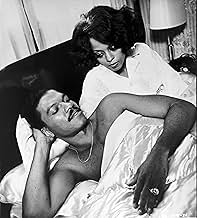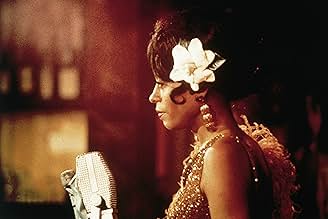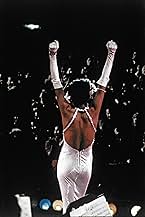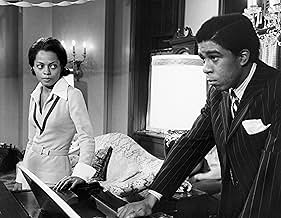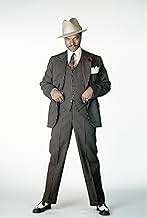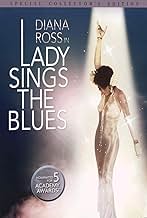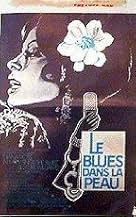Aggiungi una trama nella tua linguaThe story of the troubled life and career of the legendary Jazz singer, Billie Holiday.The story of the troubled life and career of the legendary Jazz singer, Billie Holiday.The story of the troubled life and career of the legendary Jazz singer, Billie Holiday.
- Regia
- Sceneggiatura
- Star
- Candidato a 5 Oscar
- 5 vittorie e 8 candidature totali
- Reg Hanley
- (as James Callahan)
- The Singer
- (as Michele Aller)
Recensioni in evidenza
But with all that said I was still horribly put off by the lack of continuity with the spirit of Billie's life. For one thing, Diana's portrayal made Billie look like a blabbering halfwit. Even in the scenes where she's supposed to be stone cold sober she acts like a flake. If you've ever seen footage of the real Billie, you know that the real Lady was a tough, sharp, smart human being. You don't survive on the streets of New York by being an idiot the way she's shown to be in the film.
Next, the performances were shown totally out of context. For example, the song "My Man" is a chilling song about spousal abuse, but in the movie they gloss it up to be a feel-good homage to her guardian angel of a husband Louis McKay. In real life, Louis was as abusive as all of her husbands (hence the song "My Man"). This is just one example of the many incorrect interpretations this movie presents of Billie's music and her life.
OK, but like I said in my 1st paragraph, I can allow the director some poetic license if the movie is worthwhile. Unfortunately this movie didn't deliver. Instead of focusing on the true hardships and trials that plagued Ms. Holiday, we get a whole bunch of clichés about drug use, trying to make it in the business, and how you're supposed to be good to your friends. I'm not sure if this was supposed to be about Billie Holiday or if it was just an ABC afterschool special with clever packaging.
The acting was good (if you choose to accept the idea of Billie Holiday being a weak minded flake), and there were several dramatic moments that were well staged. But here's my biggest gripe: the musical score KILLED this movie! It's supposed to be a 1940s jazz biopic, so why are we getting 70s "star search" orchestrations? You know, like the cheezy swelling violins and pseudo-disco drums when Ed McMahon reads the winner of the competition. Talk about an anachronism, to say nothing of the way it cheapens some otherwise powerful moments.
Lastly, I have to say that fans of Billie's music will be pretty annoyed at Diana Ross's versions. They are two totally different singers. Billie sang in a lower register (except when hitting those high notes which she always did clean & clear WITHOUT vibrato) whereas Diana prefers theatrics in the upper register and doesn't go very low at all. This is really a movie for Diana Ross fans or for casual jazz listeners who have never heard of Billie Holiday. Like another reviewer suggested, if you're truly interested in Billie, you should buy some of her records or try to find some old films of her performances. Her music is the best biography you'll ever get.
Bearing no physical and little vocal resemblance to Holiday, Ross somehow gets under her true-life character's skin much like Joaquin Phoenix does in "Walk the Line" or Jamie Foxx in "Ray". Thirty-three years have elapsed since I first saw this movie, and it is with a certain amount of regret that I report that Ross as an actress has not been anywhere near this good since then. Granted she only has three features under her belt, 1975's "Mahogany" reflected an ego run amok, and she was disturbingly miscast in 1978's "The Wiz". From the opening scene where she is suffering through heroin withdrawal in raw, harrowing detail to her sultrier nightclub performances, she manages to be incendiary by her sheer will. She is even convincing in the early scenes where she is barely a teenager. Her vocal performances really don't evoke Holiday's earthier style, though to Ross's credit, her vivid renditions of standards such as "Mean to Me", "Fine and Mellow" and "Gimme a Pigfoot (and a Bottle of Beer)" don't sound like Supremes redux either.
This achievement is all the more impressive since director Sidney J. Furie, a journeyman filmmaker at best, has surrounded Ross with an unwieldy rags-to-riches biopic that should have been edited down from its 144-minute running time. The screenplay - credited to Chris Clark, Suzanne De Passe and Terence McCloy (none of whom wrote a movie script before or since) based in part on Holiday's autobiography - plays fast and loose with the facts and piles on the clichés in true Oscar-baiting fashion. The drug-related scenes are powerful, though they eventually start to feel like condescending plot devices to make the viewer sympathize with Holiday for the persecution she experienced at the hands of abusive men and a bigoted society. Moreover, as Furie discloses on the accompanying audio commentary, the dialogue for several scenes is improvised by the actors, for example, the unnecessarily lengthy Club Manhattan sequence, where the lack of discipline becomes wearing.
Contrary to the fact that Holiday's true life story has been well documented and interest in her legacy increased, the filmmakers altered events and people in order to maintain interest from what they thought were mainstream audiences at the time. Consequently, the character of Louis McKay, Holiday's love interest and eventual husband, played with toothsome charm by Billy Dee Williams, synthesizes a lot of men who came into her life and helped shape her career. The dramatized results leave out key figures of the jazz world like saxophonist Lester Young, trombonist Jimmy Monroe to whom Holiday was married, and record producer John Hammond, as well as Benny Goodman, Count Basie, Artie Shaw and Teddy Wilson--all important colleagues and mentors during the period covered in the film. Instead, we are given Holiday's story as filtered through Ross's own story, an observation confirmed by Ross herself on the accompanying 2005 making-of featurette.
When the music is true to the period, it's quite wonderful, but composer Michel Legrand composed some gauzy, anachronistic interludes that sound like symphonic outtakes from his work on "Brian's Song". The costumes also have a Vegas revue feel, no surprise since designer Bob Mackie's flamboyant, early 1970's style is on full display here. For such an overlong movie, the ending feels quite truncated as newspaper clips are used to telegraph her eventual fate as Ross triumphantly sings her signature song, "God Bless the Child", in Carnegie Hall. Credit Motown mogul and Ross's Svengali, Berry Gordy, for having the fortitude, foresight and tenacity to oversee the project, and the DVD hammers that point in not only the overemphatic, only partially insightful commentary by Furie, Gordy and artists' manager Shelly Berger but also the making-of featurette which features Ross looking strangely youthful and Williams at least looking his age. There are several deleted scenes included in the DVD with no additional commentary from Furie, none refurbished and all understandably excised from the final cut.
The film is imperfect. Flawed. It could have been more realistic, more harrowing, and less hollywood-fied. Had it been, and had Motown not been so intent on proving itself as a major film force, she would have won the Oscar without question. The rumor had always been that in terms of voting it was "this close" as they say.
Even though she did not win, we are still left with a performance of depth, passion and layers that could only be described as magnificent in an experienced actress. In a neophyte, as Miss. Ross was at the time, it is stunning.
As a singer, She never before or since has sounded as good. The voice, while not really like Billie Holiday, just glows. Her musicality, intonation and idiomatic phrasing indicated a whole type of music she could have sung had she chosen too.
Watch it for her. It will make you think more kindly towards her the next time she, well, acts like Miss. Ross!
Amadeus is also criticized as unhistoric, which it is, but it made the best of Mozart's life by putting his music at center stage. (It also helps that the events it portrayed were in chronological order.) The same could have maybe rescued LADY SINGS THE BLUES, but the opportunity was missed. Other than Diana Ross's harrowing portrayal of a heroin addicted singer (who could have been anyone but Billie Holiday), there is nothing to recommend this movie. Go watch Ken Burns' JAZZ series instead.
Lo sapevi?
- QuizAccording to Diana Ross, Richard Pryor instructed her on how to behave during the scenes of drug use.
- BlooperSome of the African-American male characters and extras sport modern (1972) hair styles with Afros or sideburns which were not in style in the 1930s.
- Citazioni
Billie Holiday: [after Louis discovers that Billie shoots up] Sure I've taken a few shots, but only when I needed it,
[Louis sighs]
Billie Holiday: but i'm not hooked, Louis. I'm not.
Louis McKay: Only when you needed it. What do you think hooked is? All I had to do is listen to your voice on the telephone and I knew. Who the hell do you think you're talking to? One of those ofay cats you be running around with? I've been on those streets all of my life. I know what that shit is!
Billie Holiday: It's good, ain't it?
[Louis then gets up and takes her suitcase and starts packing her stuff]
Billie Holiday: Wait, Wait, Baby! Oh, no.
Louis McKay: We're going home. Now!
Billie Holiday: [Stopping him] Wait, hey, baby, wait. See, you don't understand. Now, you don't know how it is when people are looking down at you and laughing at you and think that I'm a loser. And if I go home now, I'll think that I'm one, too. I gotta prove it to them. I gotta prove it to myself.
Louis McKay: What're you proving with that needle? That you're not woman enough to make it without a crutch? A magic way out when the going gets a little too rough? I want you to make it, too, baby. But not this way. Not this way.
- ConnessioniFeatured in Lady Sings the Blues (Featurette) (1972)
- Colonne sonoreTain't Nobody's Business
Written by Porter Grainger and Everett Robbins
Sung by Blinky (as Blinky Williams)
I più visti
Dettagli
- Data di uscita
- Paese di origine
- Lingua
- Celebre anche come
- El ocaso de una estrella
- Luoghi delle riprese
- Aziende produttrici
- Vedi altri crediti dell’azienda su IMDbPro
Botteghino
- Lordo Stati Uniti e Canada
- 6.028.486 USD
Contribuisci a questa pagina



